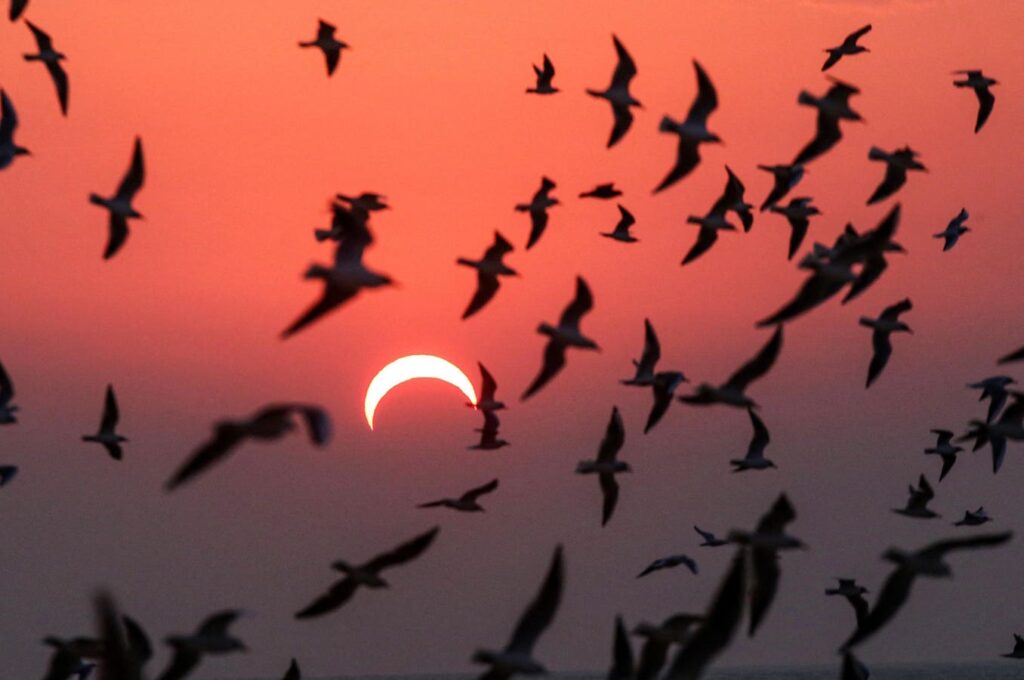A partial solar eclipse will occur on March 29, 2025 and be visible in the Northern Hemisphere. … [+] (Photo by YASSER AL-ZAYYAT/AFP via Getty Images)
AFP via Getty Images
When is the next solar eclipse? It’s on Saturday, Mar. 29, 2025, but exactly where you are on Earth will determine whether you can see any of the sun disappear behind the moon during a partial solar eclipse.
While not as big a deal as the total solar eclipse on Apr. 8, 2024, across North America, the event will arguably be best seen from the continent.
Here’s everything you need to know about the first and the best solar eclipse of 2024:
What Is A Partial Solar Eclipse?
It’s when the moon moves in front of the sun, blocking some of it from view, but at no point covers the entire disk. However, Mar. 29’s event will see up to 94% of the sun covered, which makes it a very deep partial that many eclipse-chasers buoyed by the event of Apr. 8, 2024, will want to use their eclipse glasses to see. Eclipse glasses will be essential at all times for the event.
ForbesTotal Solar Eclipse 2024 Photos: NASA Astronauts Take Historic Images From SpaceBy Jamie Carter
What Happens During A Partial Solar Eclipse?
Throughout a couple of hours, the new moon — which will be completely invisible — approaches the dun and takes a bite out of it. That bite gets larger, peaks, and then the moon retreats, eventually leaving the sun’s disk whole again. The critical moment during a partial solar eclipse is typically at peak eclipse when the moon covers the biggest amount of the sun. However, for Noth Americans, the critical moment for this event will be to see an eclipsed sunrise.
ForbesMeet The Country About To Have Three Solar Eclipses In Three YearsBy Jamie Carter
Where Is The Eclipse?
March’s partial solar eclipse will be visible only from the Northern Hemisphere, including North America, Europe and northwest Africa. Although it will be seen from parts of North America, it won’t be a continent-wide event. Only those in the northeast east of the U.S. will get a view, with those in the far northeast treated to an eclipse sunrise — a rare and beautiful spectacle. The best place for that will be New Brunswick and far north Quebec in Canada, but locations in the U.S. from Pennsylvania to Maine will see an eclipsed sunrise. However, going northeast will mean a deeper and longer eclipse.
Elsewhere, the western coast of Greenland can expect a mid-morning eclipse of up to 86% eclipse coverage, Iceland’s Westfjords around 70%, Dublin 41%, London 30%, Paris 23%, Berlin 15% and Casablanca, Morroco 18%. An eclipsed sunset will be witnessed by nobody from the (uninhabited) Severnaya Zemlya, an archipelago of usually ice-packed Arctic islands.
Forbes18 Places To See The Next Total Solar Eclipse In 2026By Jamie Carter
When Is The Eclipse?
The partial solar eclipse will occur from 08:50 to 12:43 UTC, from 4:50 a.m. to 8:43 a.m. EST. However, the event will take anywhere from a few minutes to a few hours from any specific location. For exact timings for where you are, check the eclipse calculator on timeanddate.
The following solar eclipse —another partial — will take place on Sept. 21, 2025, viewable only from Tasmania (Australia), New Zealand, the South Pacific and Antarctica.
Wishing you clear skies and wide eyes.
Source link : http://www.bing.com/news/apiclick.aspx?ref=FexRss&aid=&tid=6764099b52c84089815a15730f2d32bd&url=https%3A%2F%2Fwww.forbes.com%2Fsites%2Fjamiecartereurope%2F2024%2F12%2F19%2Fits-100-days-until-north-americas-next-solar-eclipse—what-to-know%2F&c=17538814315475788716&mkt=en-us
Author :
Publish date : 2024-12-18 20:59:00
Copyright for syndicated content belongs to the linked Source.
